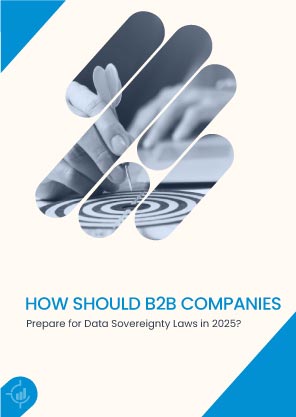or call: +1 (845) 347-8894

or call: +1 (845) 347-8894

A U.S.-based software company closes a multi-year deal with a European enterprise client. All goes well until a compliance audit discovers that customer information is being processed by servers outside the EU, breaking regional data residency regulations. The contract is put on hold, and the firm finds itself with legal expenses, business disruptions, and a tarnished image.
Situations like this are becoming increasingly common as data sovereignty laws take center stage in global business. These regulations are not limited to legal departments; they now impact how B2B companies design infrastructure, handle partnerships, and provide customer experiences across borders.
This article offers a clear framework to help B2B organizations understand these laws, mitigate compliance risks, and build strategies that support long-term growth in a more regulated digital economy.
At its core, data sovereignty means that data is subject to the laws of the country in which it is collected, stored, or processed. When a country enforces data sovereignty laws, it requires that certain types of data, especially personal or sensitive information, be handled within national or regional boundaries.
This is particularly relevant in countries like:
As of early 2025, 11 new comprehensive privacy laws will come into effect across multiple U.S. states, bringing the total number to 20. This means nearly half of the U.S. population is now covered by state-level privacy regulations, underscoring a fragmented but growing focus on data protection.
B2B companies, especially those offering cloud platforms, analytics, or enterprise software, must ensure that every piece of customer data aligns with local compliance rules. Failure to do so can result in hefty fines, suspended contracts, or long-term reputational damage.
Until recently, many companies viewed data compliance as a function of legal or IT teams. That mindset no longer works. In 2025, data sovereignty intersects with business development, product design, marketing, and customer success.
Here’s why this shift matters:
As B2B firms expand into international markets, they must understand each jurisdiction’s data regulations. What’s permissible in the U.S. may be unlawful in Germany, India, or Australia. Companies without a tailored data governance model risk launching products in markets where they are not legally compliant.
Enterprise buyers expect partners to have mature data protection strategies. When privacy policies are vague or data residency is unclear, buyers hesitate. Meeting data sovereignty requirements is no longer a value-add; it’s an expectation.
Privacy and transparency are becoming competitive advantages. Organizations that invest early in compliance are better positioned to build trust with clients, win regulated contracts, and establish global credibility.
Failing to account for data sovereignty laws can impact your business in more ways than one. Below are three high-risk areas where B2B companies face legal and operational exposure.
Many B2B companies use global SaaS platforms or cloud infrastructure. These systems often move data across borders automatically, without clear user control. With frameworks like the EU-US Privacy Shield invalidated, businesses relying on standard cloud routing are exposed to legal challenges unless they adopt alternative safeguards like Standard Contractual Clauses (SCCs) or Binding Corporate Rules (BCRs).
Even if your internal systems are compliant, third-party tools integrated into your platform might not be. Analytics software, payment processors, or CRM tools could transmit data to regions not approved under local law. If a vendor violates a regulation while handling your customers’ data, your company can still be held liable.
Data categories that are considered routine in one country may be restricted elsewhere. For instance, IP addresses, geolocation, or behavioral data are treated as personal information under some privacy laws. Without localized knowledge, your system may collect what regulators consider sensitive, without appropriate protection.
The legal terrain is shifting fast, but B2B companies can take a proactive approach to compliance. Here are five critical steps to building a data governance strategy that aligns with today’s sovereignty standards.
Begin with a detailed data mapping exercise. Understand:
This audit is essential for identifying vulnerabilities, particularly when data flows involve high-compliance jurisdictions such as the EU or China.
To comply with data sovereignty laws, select cloud providers that offer localized hosting. This ensures sensitive data remains within approved borders.
Develop a strict procurement and review process for third-party tools:
Make vendor accountability a contractual requirement, not a suggestion.
Shift from reactive to proactive development by embedding privacy and compliance controls into your software:
These design choices show maturity and help your product meet diverse regulatory standards from day one.
Establish a data governance committee or assign a dedicated privacy officer. Their role should include:
This centralized oversight ensures your policies evolve with the regulatory landscape.
While some companies view sovereignty as a legal burden, forward-thinking B2B firms use it to differentiate themselves.
When you build compliance into your systems, entering new markets becomes faster and more efficient. You avoid costly retrofits, delays, or blocked deals.
Prospects often evaluate vendors based on their ability to safeguard data. By offering clear, transparent documentation on data handling and residency, you increase buyer confidence and reduce friction in sales cycles.
In an era where privacy breaches dominate headlines, being seen as a compliance-first company enhances your public image. This perception matters, especially when pursuing contracts with governments or large enterprises.
As AI systems increasingly rely on customer data for training and decision-making, regulators will introduce new restrictions on what data they can use and where. Sovereignty laws will begin to apply to data pipelines feeding AI systems, not just the applications themselves.
Sectors like healthcare, defense, and financial services are already seeing bespoke rules layered on top of general data laws. B2B vendors serving these industries will need adaptable compliance frameworks tailored to client sectors.
Expect a rise in government-led or government-approved cloud ecosystems. These sovereign clouds not only ensure full data residency but also align with national security requirements, while simultaneously enforcing sector-specific controls, especially in public sector procurement.
In 2025, data sovereignty laws are not just checkboxes to tick; they are structural realities that shape how B2B companies grow, partner, and compete. Those who treat compliance as a reactive duty will find themselves constantly behind. Those who embrace it as a strategic investment will lead.
The time to prepare is now. By aligning operations with evolving regulations, B2B companies can protect themselves from legal exposure, build stronger client relationships, and position themselves as trusted players in a privacy-driven global economy.
The laws of the country where companies collect data require them to store, process, and govern personal or sensitive data accordingly. These regulations aim to protect citizens’ privacy and prevent unauthorized cross-border data transfers.
B2B companies often operate across borders, using global cloud infrastructure and third-party tools. In 2025, stricter regulations make it essential to comply with each region’s data handling rules to avoid legal penalties, lost contracts, and reputational harm.
Key jurisdictions with strict data sovereignty laws include:
Yes, if the provider stores or transfers data outside the required jurisdiction without appropriate safeguards (e.g., SCCs or regional hosting), it may consequently violate local laws. It’s important to select providers with compliant in-region data centers.
To participate in our interviews, please write to our IntentTech Media Room at sudipto@intentamplify.com




